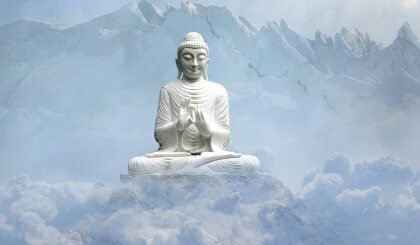Achieving Nirvana: The State of Freedom

Nirvana is considered a state of freedom from suffering or dukkha and part of the rebirth cycle in Śramaṇa philosophy. It’s one of the most important concepts in Buddhism, Jainism, and Hinduism. Different spiritual practices or techniques help people achieve nirvana.
Those who achieve Nirvana will be completely free of all suffering. You can only reach Nirvana after an arduous and lengthy spiritual journey. At the end of your struggle, you’ll be free of any kind of ties or suffering.
“There is, o monks, a state where there is neither earth, no water, nor heat, nor air; neither infinity of space nor infinity of consciousness, nor nothingness, nor perception nor non-perception; neither this world nor that world, neither sun nor moon. It’s the uncreate. That, O monks, is neither coming nor going nor standing; neither death nor birth. It’s without stability, without change; it’s the eternal which never originates and never passes away. And it’s the end of sorrow.”
-Siddhartha Gautama-
Why is Nirvana Important in Buddhism?
The state of Nirvana is extremely important in Buddhism because it breaks the cycle of Samsara. Said cycle perpetuates suffering through reincarnation and experiences that are the fruit of karma.
If you reach Nirvana, you experience absolute freedom because the cycle of life and death is finally over. Your karmic debts are paid and you’re free of any kind of possible suffering.

Nirvana is the final level of freedom for those who practice Buddhism, Hinduism, and Jainism. You could say that reaching Nirvana opens the door to a holistic peace, far from any kind of external circumstances.
Likewise, people also use the term in a more general way to talk about overcoming difficult challenges or achieving something complicated. Any kind of situation or negative feeling that causes suffering could be an obstacle to your wellbeing. Consequently, Nirvana can help free your soul and feel the fullness of existence.
How to Achieve this State of Freedom
The path to Nirvana is a personal process of discovery. Your journey to discover absolute truth won’t lead you to a particular place. Rather, it’s a state of mind. If you want to achieve total freedom, you have to give up all attachments and material desires. Those who believe in Nirvana think that these attachments will only bring suffering.
A person can reach complete freedom when they overcome everything that previously tied them down. At that moment, they’ll experience joy. Then, it isn’t necessary anymore to be part of the cycle of death and life. All their karmic debt is automatically erased.
While all of this is true according to the traditions we mentioned above, it’s impossible to completely define Nirvana because that would limit it.
Nirvana from a Psychological Point of View
From a psychological point of view, achieving Nirvana puts you in a state of peace, of being free from the weight of conflict. It’s a state without tension or stress. The absence of mental tension won’t decrease sensory reflexes but would provide emotional stability. Doesn’t that sound nice?

Nirvana in and of itself isn’t a psychological concept. However, the idea of Nirvana is something that we can all aspire to. It’s a positive starting point from which you can recharge your batteries and make changes.
At the same time, it offers an interesting perspective on the motivating and frustrating role that desire plays in our lives. Desire can be the stone that pulls you to the bottom of the sea if you’re feeling pessimistic, but it can also be a source of energy and inspiration when you’re feeling optimistic.
This text is provided for informational purposes only and does not replace consultation with a professional. If in doubt, consult your specialist.








